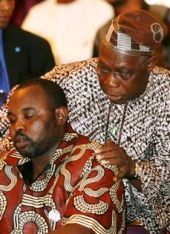Sudan, main Darfur rebel group seal peace deal
May 5, 2006 (ABUJA) — Hopes rose for peace in the devastated Sudanese region of Darfur when the government and the main rebel faction signed a peace deal for the region, although other rebel groups still refused.
 The deal was signed by representatives of Khartoum and the main faction of the Sudanese Liberation Movement (SLM), led by Minna Minnawi, in the presence of the peace talks host Nigerian President Olusegun Obasanjo and mediators.
The deal was signed by representatives of Khartoum and the main faction of the Sudanese Liberation Movement (SLM), led by Minna Minnawi, in the presence of the peace talks host Nigerian President Olusegun Obasanjo and mediators.
But another rebel group, the Justice and Equality Movement (JEM), and a smaller faction of the divided SLM refused to sign, saying they would not accept the United Nations-sponsored deal.
Senior international envoys, including United States Deputy Secretary of State Robert Zoellick, had travelled to Abuja warning that failure to reach an agreement could also aggravate the fragile humanitarian situation in Sudan.
Several deadlines came and went as the Western diplomats fine-tuned the draft deal, pressing the government to provide better guarantees that it would disarm the notorious Janjaweed Arab militia and recruit former rebels into the national armed forces.
But while Minnawi’s SLM faction eventually agreed, the smaller SLM faction and the JEM said the proposal still failed to answer demands that Darfur’s three states be united into a single autonomous region.
Abdelwahid Al-Nur, the leader of the smaller SLM faction, said: “We need the document to be improved upon. We are not going to sign it.”
The accord signed by Khartoum and Minnawi’s faction offers a referendum in the arid desert region, and Zoellick said it would also oblige the government to disarm and neutralize the Janjaweed.
A spokesman for Minnawi, Saifaldin Haroun, said the SLM had accepted the AU proposal with the new changes, “but we need to sit with the other SLM (faction) and the JEM and discuss with them.”
“We need to go together or else there is going to be a problem. The areas in which we need changes effected are power sharing and security arrangement,” Haroun added.
He thanked the international community for its efforts to salvage the talks, which were mediated by the AU in the Nigerian capital, Abuja.
“We cherish the international community and we do not want to lose their support. Our acceptance of the document is the first step to peace,” he added.
Despite massive pressure from international mediators, both the SLM groups and the JEM had initially refused to sign the deal, even at the risk of international sanctions.
Darfur, an arid desert region of western Sudan the size of France or Texas, erupted into civil war in early 2003 when armed local movements began fighting the Arab-led government in Khartoum, demanding more autonomy for the region.
In response, the Sudanese regime unleashed the Janjaweed militia to carry out brutal attacks on Darfur’s largely black African population. The war has caused at least 180,000 deaths and left 2.4 million people homeless.
International envoys including Zoellick tried during the talks to pressure the warring parties into a peace deal which would allow humanitarian aid to flow and elections to be held.
Zoellick Friday insisted the peace proposal could satisfy the warring parties.
“What this agreement does, it creates an obligation on the government to take the steps many people around the world want them to take in terms of disarming and neutralizing the Janjaweed,” he said.
“It also creates an opportunity for the rebel movements to begin (the) integration process. They already have an obligation to ceasefire.”
Zoellick said “the agreement creates political opportunities so people will have to decide if they want to be part of it or not.”
